Конспект уроку з англійської мови на тему : " School rules"
Анотація до уроку англійської мови у 7 класі на тему : «School rules»
Урок відповідає навчальній програмі « Навчальні програми з іноземних мов для загальноосвітніх навчальних закладів ».
Тип даного уроку: урок формування умінь та навичок, а саме його різновид урок творчого застосування знань і вдосконалення вмінь.
Основна дидактична мета: з'ясування можливостей застосування знань у навчальному пізнанні і практичних ситуаціях, формування досвіду такого застосування, предметних і загальних навчальних вмінь з допомогою ІКТ.
На уроці стимулюється робота із словником, розвиваються навички перекладу та виховання інтересу до подальшого пізнання шкільних правил та їх дотримання в школі за допомогою словосполучень. Формується позашкільна робота - лексична, модальні дієслова – граматична, соціокультурна (цінності, ідеали, поведінка) та загально - навчальна компетенції.
Урок супроводжується учительською комп'ютерною презентацією PowerPoint 2010, значно підвищує інтерес учнів до навчання.
До уроку додається роздатковий матеріал для групової роботи на етапі актуалізації опорних знань, вивчення прислів'я про шкільні знання та навчання.
Список використаної літератури при підготовці до уроку:
1.Підручник О. Карп'юк Англійська мова 7 клас
2.Посібник Павліченко О. М. Англійська мова. Граматичний практикум.
УРОК ДЛЯ УЧНІВ 7 КЛАСУ ПО ТЕМІ « School Rules»
за підручником О. Карпюк.
Objectives:to practice reading and speaking about school life and school rules ;to encourage pupils to memorise useful vocabulary; to revise pupils’ knowledge on the topic; to develop pair and group communicative skills, memory, creative abilities and pupils’ imagination.
PROCEDURE
I.Organization moment
T: Good morning, children. Nice to see you. How do you feel
P1: I feel happy today
P2: I have a headache. I feel bad today.
P3: As for me I am good.
T: Dear children, there are several essential things and places you always want to come back to. They are your home, your birthplace and the school you go to. Today we are going to speak about school, school rules and school activities. We’ll practice reading , listening, lexical and grammar rules on the topic. So welcome to school !
II. WARMING UP
Phonetic drills
T: We’ll begin our lesson with phonetic drills
School subjects:
- Biology
- Math
- Geography
- English
- History
- Music
- Technology
- Information Technology
- Physical Education
- Chemistry
- Physics
- Ukrainian
- Foreign Literature
- Arts
Which of these subjects do you study ? Do you study any others ?
Ask and answer questions about your partner’s timetable.
E.g. What lesson do you have on Monday ?
III. THE MAIN PART OF THE LESSON
T: You have to listen to the text about school and answer the questions.
MY SCHOOL
I’m going to tell you about my school. It is new and modern and I like it very much.It has three floors. The classrooms are light and spacious. There are classrooms for different subjects, such as English, History, Mathematics, Chemistry, Geography, Biology, Ukrainian, World Literature etc.
There is a computer class in our school. We study computer science here. The computer class has the most modern equipment and the Internet access.
We have also an assembly hall. Meeting, conferences, concerts take place here. We sing songs, recite poems and dance.
Our school has a gym, a sports ground, a football field, a swimming pool. There are different sports groups here: table tennis, swimming, athletics, football, volleyball, wrestling and gymnastics. Many pupils of our school attend these groups.
The teachers of our school are very skilled and intelligent people.
I think school years are very important for every person. So I’ll never forget my school , my teachers and my classmates.
T: Now answer my questions according to the text:
- What kind of school is it ?
- How many floors does it have ?
- What classrooms are there at school ?
- What do children have in the assembly hall ?
- What sports do they go in for ?
- What kind of people are the teachers at school ?
PAIR WORK
T: To my mind the school life is boring without school rules. There are “ good” rules we have to follow and “ bad” rules which we don’t have to follow. Here you can see the list of these rules. Read, translate and say what rules should pupils follow and obey in your school and what rules shouldn’t they follow. We have an opportunity to revise the modal verbs “ should “ and “ shouldn’t “.
- to be tidy and polite
- to be late for class
- to eat in class
- to help pupils when they ask
- to speak clearly
- to smoke at school
- to miss the lessons
- to do homework on time
- to chew gums in class
- to use a mobile phone in class
- to wear a school uniform
- to bully
- to copy other pupils’ work
- to listen to teachers at school
- to take part in different after classes activities
- to take toys to school
P1 : We should be tidy and polite
P2 : We shouldn’t eat in class
P3 : We should do homework on time
P4 : We shouldn’t miss the lessons
WRITING
Answer the questions about our native school
- What school do you study at ?
- How often do you go to school ?
- When do your classes start ?
- Is your school a modern building ?
- How many floors does it have ?
- Are there many classrooms in it ?
- What subjects do you study ?
- What languages do you study ?
- Where is it situated ?
- What school rules do you like best of all ?
GROUP WORK
( учні розподіляються на дві групи згідно обраних червоних і синіх фішок )
T: You will be divided into two groups. The first group will make a list of things you appreciate in your school which really help you in studying and the second group will write about negative things which are considered to be boring .
P1: Our group considers that we should appreciate …….
P2: Our group considers that some things are boring
at school. They are …….
SPEAKING
T: We go to school to get knowledge and to participate in different activities. Look at the pictures and say what school activities the children are fond of.
( слайди із зображенням шкільної і позашкільної роботи учнів )
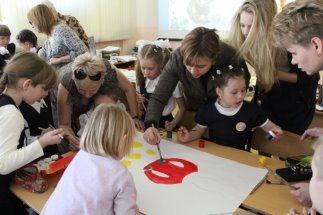

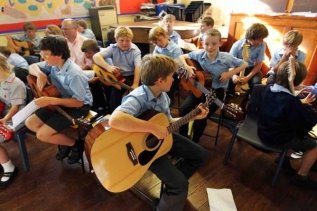
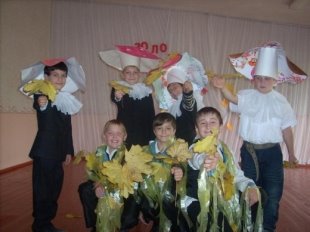
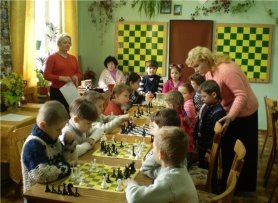
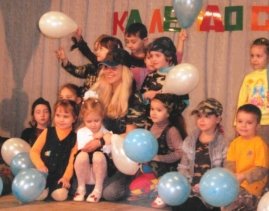
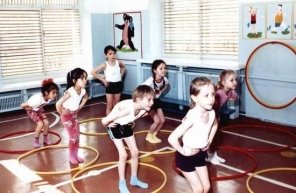
P1 : In this picture the children are fond of drama club.
P2 : They are interested in sport games.
P3 : I think these pupils enjoy music.
P4 : I suppose they like playing computer games.
IV. SUMMING UP
T : We have done a great deal of work today. What lesson activity did you like most of all, children ?
P1 : Most of all I liked listening to the text “ My school “.
P2 : I enjoyed the group work.
P3 : As for me I liked doing exercise and reading about school rules.
( вчитель виставляє учням оцінки )
HOME ASSIGNMENT
Make up dialogues on the topic “ At the English lesson”.


про публікацію авторської розробки
Додати розробку
